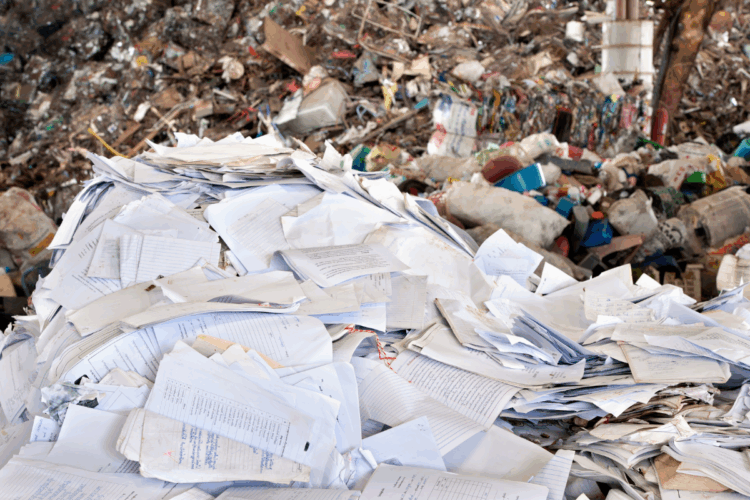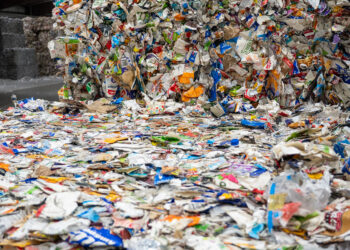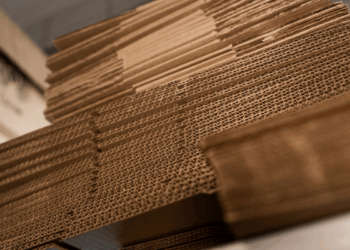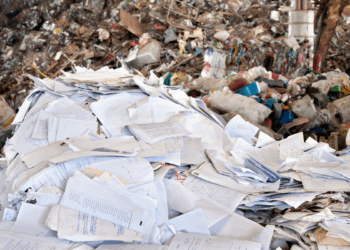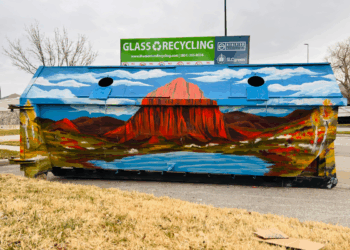The latest earnings calls for recycled paper, glass and plastic end users and processors have brought facility closure and layoff announcements, at times contrasting with recent expansion plans.
Many closures are attributed to economic conditions and efforts to improve efficiency. Others are framed as moves to localize supply chains and often involve states, such as Texas and Georgia, that offer low energy costs, rapidly growing populations and attractive business incentives.
One example is Graphic Packaging, whose executives said in a February earnings call that their new recycled paperboard plant in Waco, Texas, remains on track to start up in late 2025. The plant will be able to process up to 15 million paper cups per day and is centrally located to take advantage of the booming population of the Dallas/Fort Worth, San Antonio and Houston metro areas.
The new plant, along with facility closures, has been touted as part of the company’s plan to optimize its coated recycled paperboard business by decommissioning older, less efficient assets such as the K3 machine in Michigan in fall 2023.
In the February call, CEO Michael Doss indicated the company would continue to rationalize less efficient assets once Waco is functional. “The ultimate, most likely result is, we will close our smaller undercapitalized facilities in Ohio.”
Throughout the paper fiber sector, facility closures and layoffs are set against a backdrop of new capacity, contentious price increase attempts and a shift away from third-party indexes, domestic mill operating rates and uncertainty surrounding the impact of tariffs on goods packaged in boxes.
In Iowa, International Paper is building a newly announced plant in Waterloo, Iowa, to be located closer to several protein customers. But in mid-February, the company announced it would close several plants, including a recycling plant in Phoenix, by the end of April, affecting 674 employees.
Executives at Smurfit Westrock said in a Feb. 12 earnings call that they continued to “streamline” the new company as it “decentralizes,” with more than 1,000 people globally laid off.
And in January, Packaging Corporation of America filed a state notice in Georgia that it was closing a facility there, affecting 103 workers. Industrial packaging company Greif announced it would shut down a mill in Massachusetts and an uncoated recycled paperboard machine in Georgia this spring, affecting a total of 140 workers.
Glass struggles to capture packaging growth
The glass industry also is struggling to adapt in challenging economic times and broad shifts in packaging trends. In early 2025, new O-I Glass CEO Gordon Hardie noted that much of the growth in food and beverage packaging in the past decade has been in cans.
He said when glass gets down to about 15% of the cost of aluminum cans, “you see a quite measurable flow from cans back into glass.” But the price point is not there currently.
In a late July earnings call in 2024, Hardie said the company planned to close at least six furnaces globally over the following nine months as part of its “Fit to Win” initiative. In October the company confirmed it would shut its Streator plant in Illinois and its innovation center in Perrysburg, Ohio.
Globally, O-I used an average of 40% recycled glass in its products in 2023, according to its latest sustainability report.
And since June 2024, Ardagh Glass Packaging has announced three facility closures affecting nearly 800 workers: in early February for Dolton, Illinois; in November 2024 for Seattle; and in June 2024 for Houston.
Ardagh is a major end user of recycled glass, incorporating 39% cullet in its feedstock in 2022, according to its latest sustainability report. The closures have had varying effects on the local glass recycling system. In Seattle, the closure removed the major regional end market for recycled glass, causing temporary disruption in local collections. But in Illinois, which has a higher concentration of glass manufacturers, stakeholders anticipate less disruption.
A spokesperson for major glass processor Strategic Materials said Ardagh’s Illinois closure is disappointing, but that Strategic does “not expect negative impacts to glass recycling in the region. The demand in the Midwest is strong.”
Recycled plastics industry still emerging
In the emerging plastics recycling space, economics are proving challenging amid persistently cheap virgin resin, imports and slower-than-expected conversion from brand owners. Amid these pressures, some companies are closing facilities or moving operations.
In January, Evergreen Recycling posted California Worker Adjustment and Retraining Notifications indicating it would shut down sort and wash operations at its Riverside plant, affecting 57 workers.
In February, Pactiv Evergreen filed a Michigan WARN indicating closure of its Kalamazoo recycling plant, affecting 153 workers. In December 2024, Novolex announced it was acquiring Pactiv Evergreen, and the deal is expected to close in mid-2025.
Plastic pallet maker Orbis is closing a Wisconsin facility and moving production to its Greenville plant in Texas, affecting 109 workers. Orbis includes post-industrial plastic scrap in some of its reusable products.
Meanwhile, plastic siding and decking company Azek Building Products recently announced its acquisition of an Indiana PE and PVC recycler in late 2024 to help provide localized vertical integration for its recycling plant in Wilmington, Ohio. In a Feb. 4 earnings call, CEO Jesse Singh didn’t rule out further similar acquisitions, saying the company is looking at “the potential for additional recycled assets that would help us localize and expand our capacity in a similar way.”
Hauler Republic Services is building four plastics sorting centers across the U.S., with resin production for its Blue Polymers joint venture co-located at each site. In a Feb. 13 earnings call, executives said the construction on the sorting center in Indianapolis was complete, and the Blue Polymers plant was expected to be done by mid-2025.
The company opened its first sorting facility in Las Vegas in December 2023 and is building a Blue Polymers site in Buckeye, Arizona, that is expected to be complete by the end of the year. Two more locations have yet to be announced.












